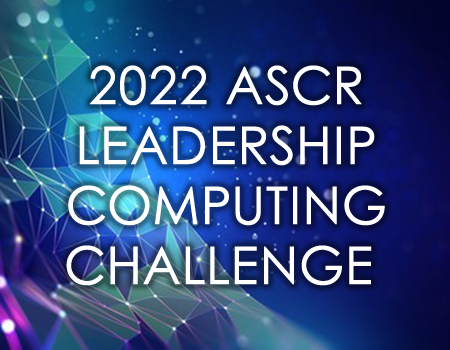 The Department of Energy Office (DOE) Office of Science has opened a call for the Advanced Scientific Computing Research (ASCR) program’s Leadership Computing Challenge (ALCC) program.
The Department of Energy Office (DOE) Office of Science has opened a call for the Advanced Scientific Computing Research (ASCR) program’s Leadership Computing Challenge (ALCC) program.
Open to scientists from the research community in industry, academia, and national laboratories, ALCC allocates 10% to 30% of the computational resources at ASCR’s three high-performance computing facilities: NERSC at Lawrence Berkeley National Laboratory and the Leadership Computing Facilities at Argonne and Oak Ridge national laboratories. These resources represent some of the world’s fastest and most powerful supercomputers.
Pre-proposals are due December 17, 2021.
ALCC is one of several allocation programs for ASCR supercomputing facilities (see ASCR Allocation Policy) and supports ASCR’s efforts to further DOE mission science, respond to national emergencies, or broaden community access to leadership computing facilities.
To fulfill its goal of broadening community access, ALCC supports a range of project allocation sizes and allocates time across all three ASCR supercomputing facilities. However, proposals seeking very large allocations are more appropriate for the INCITE allocation program. Projects that request more than 25% of the available resources will be considered nonresponsive and may be declined without review.
The ALCC program has a strong legacy of advancing scientific discovery and innovation across a wide range of DOE mission applications, including energy-efficient engineering, computer science, materials and chemical sciences, geosciences and energy-related biosciences, biological and environmental sciences, computational fluid dynamics, high energy and nuclear physics, cosmology, the design and control of scientific user facilities and experiments at these facilities, nuclear energy, fossil energy, and renewable energy (see ALCC Past Awards and FAQ Detail).
Current Awards
ALCC issues one-year allocation awards active from July 1 to June 30 of the following calendar year. For a listing of 2021–2022 awarded projects, see Current Awards. For awards from previous years, see Past Awards.
Call Information
- Eligibility: Available to researchers from universities, industry, and government agencies; DOE sponsorship is not required.
- Award size: Small-medium (no more than 25% of available ALCC hours at a given facility. See Allocation Request Cap)
- Duration: 1 year (renewable)
- Allocation cycle: July 1, 2022 – June 30, 2023
- Preproposals due: December 17, 2021
- Preproposal decision: January 10, 2022
Read the complete call information, and learn how to apply.
# # #This work was supported by the U.S. Department of Energy’s Office of Science, through the Biological and Environmental Research program as part of the Atmospheric System Research program.

